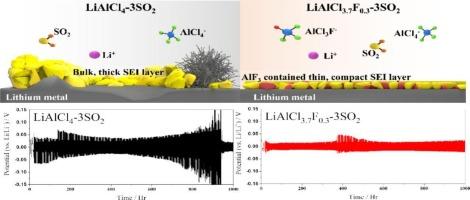提高锂金属阳极电化学性能的氟化so2基无机电解质
IF 13.2
1区 工程技术
Q1 ENGINEERING, CHEMICAL
引用次数: 0
摘要
不可燃的so2基无机液体电解质作为锂金属电池(lmb)的电解质候选者备受关注,主要是因为其不易燃、优异的离子电导率和宽的工作温度范围。尽管so2基无机液体电解质具有这些优势,但由于其难以抑制Li枝晶的生长,这是lmb安全可靠运行的关键要求,因此尚未实现商业化。在这项研究中,我们发现一种新的f取代电解质LiAlCl3.7F0.3-3SO2在不同电流密度(1-3 mA/cm2)下以3 mAh/cm2的面容量抑制了lmb中Li枝晶的生长,从而提高了循环稳定性。锂金属阳极上含有alf3的固体电解质界面相有效地抑制了锂枝晶的生长。氟化so2基无机液体电解质大大提高了锂/LiFePO4全电池的循环性能,在0.5 C的电流密度下,在1000次循环后,容量保持率达到72.7 %本文章由计算机程序翻译,如有差异,请以英文原文为准。

Fluorinated SO2-based inorganic electrolytes for enhanced electrochemical performance in Li-metal anodes
Nonflammable SO2-based inorganic liquid electrolytes have attracted attention as electrolyte candidates for Li-metal batteries (LMBs), primarily because of their nonflammability, superior ionic conductivity, and wide operating temperature range. Despite these advantages, SO2-based inorganic liquid electrolytes have not yet been commercialized because of their difficulty in suppressing Li dendrite growth, which is a critical requirement for the safe and reliable operation of LMBs. In this study, we found that a new F-substituted electrolyte, LiAlCl3.7F0.3–3SO2, suppressed Li dendrite growth in LMBs across various current densities (1–3 mA/cm2) at an areal capacity of 3 mAh/cm2, thereby improving cycling stability. The AlF3-containing solid electrolyte interphase on the Li-metal anode effectively inhibited Li dendrite growth. Fluorinated SO2-based inorganic liquid electrolyte enabled considerably improved cycling performance of a Li/LiFePO4 full cell, achieving a capacity retention of 72.7 % after 1,000 cycles at a current density of 0.5 C
求助全文
通过发布文献求助,成功后即可免费获取论文全文。
去求助
来源期刊

Chemical Engineering Journal
工程技术-工程:化工
CiteScore
21.70
自引率
9.30%
发文量
6781
审稿时长
2.4 months
期刊介绍:
The Chemical Engineering Journal is an international research journal that invites contributions of original and novel fundamental research. It aims to provide an international platform for presenting original fundamental research, interpretative reviews, and discussions on new developments in chemical engineering. The journal welcomes papers that describe novel theory and its practical application, as well as those that demonstrate the transfer of techniques from other disciplines. It also welcomes reports on carefully conducted experimental work that is soundly interpreted. The main focus of the journal is on original and rigorous research results that have broad significance. The Catalysis section within the Chemical Engineering Journal focuses specifically on Experimental and Theoretical studies in the fields of heterogeneous catalysis, molecular catalysis, and biocatalysis. These studies have industrial impact on various sectors such as chemicals, energy, materials, foods, healthcare, and environmental protection.
 求助内容:
求助内容: 应助结果提醒方式:
应助结果提醒方式:


